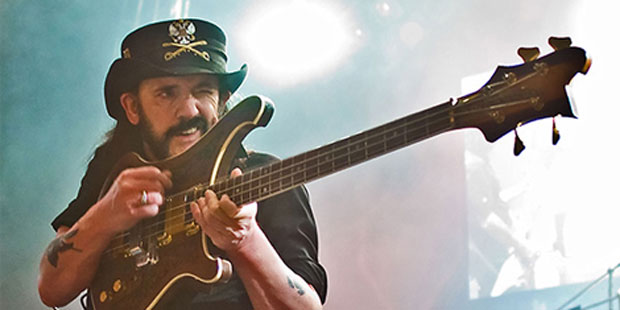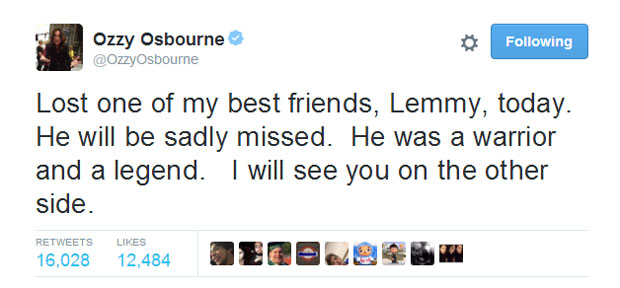Motörhead’s Lemmy Kilmister Dead at 70

Lemmy Kilmister, the iconic lead singer and bassist of Motörhead, died Monday (December 28, 2015) after a battle with cancer.
He was 70, but only recently so; his birthday was Christmas Eve.
"There is no easy way to say this," reads a post on the band's official Facebook page. "Our mighty, noble friend Lemmy passed away today after a short battle with an extremely aggressive cancer.
"He had learnt of the disease December 26 and was at home, sitting in front of his favorite video game from The Rainbow which had recently made its way down the street, with his family. We cannot begin to express our shock and sadness, there aren’t words. We will say more in the coming days, but for now, please…play Motörhead loud, play Hawkwind loud, play Lemmy’s music LOUD. Have a drink or few. Share stories. Celebrate the LIFE this lovely, wonderful man celebrated so vibrantly himself. HE WOULD WANT EXACTLY THAT."
Kilmister had suffered from several health ailments during the past year, often resulting in postponed shows. He was fitted with a pacemaker in 2013 and suffered from hematoma in 2014. Despite his ailments and 40 years of heavy drinking and hard living, Motörhead continued to tour at a heavy volume as they supported their latest studio album, 2015's Bad Magic.
"I'm all right, you know," Kilmister told Rolling Stone in August. "I'm not dying yet."
Kilmister's death comes just a month after former Motörhead drummer Phil Taylor passed away at 61.
Get The Pick Newsletter
All the latest guitar news, interviews, lessons, reviews, deals and more, direct to your inbox!
Lemmy was born Ian Fraser Kilmister on Christmas Eve 1945 in the Burslem area of Stoke-on-Trent, Staffordshire, England. When he was 3 months old, his father, an ex-Royal Air Force chaplain, separated from his mother. His mother and grandmother moved to nearby Newcastle-under-Lyme, then moved again to Madeley, another nearby town. When Lemmy was 10, his mother married former footballer George Willis, who already had two older children from a previous marriage, Patricia and Tony, with whom Lemmy did not get along.

The family moved to a farm in Benllech, Anglesey, North Wales, with Lemmy later commenting on his time there, that "funnily enough, being the only English kid among 700 Welsh ones didn’t make for the happiest time, but it was interesting from an anthropological point of view." He attended Ysgol Syr Thomas Jones school in Amlwch, where he was nicknamed Lemmy, although he was unsure why; it would later be claimed the name originated from the phrase "lemmy [lend me] a quid 'til Friday" because of his habit of borrowing money from people to feed his addiction to slot machines.
He soon started to show an interest in rock and roll. He played guitar for local bands, such as the Sundowners; Lemmy saw the Beatles perform at the Cavern Club when he was 16 and then learned to play along on guitar to their first album, Please Please Me.
In 1972, Lemmy joined the space rock band Hawkwind. After being fired from Hawkwind a few years later, Lemmy went on to form a new band called Bastard with guitarist Larry Wallis and drummer Lucas Fox. Lemmy's connection with Took When his manager informed him that a band by the name of Bastard would never get a slot on Top of the Pops, Lemmy changed the band's name to "Motörhead," the title of the last song he wrote for Hawkwind.
Besides his gravely voice, Lemmy was known for playing a very distinctive Rickenbacker 4004LK bass.
Below is an excerpt from a late-2015 interview with Lemmy from our sister publication, Bass Player.To read the entire interview, which was timed for the latest edition of Bass Player LIVE! (a November 2015 event that honored Lemmy), head here.
You mentioned Paul McCartney as an influence. What did you like about playing?
I don’t know really. When you hear the Beatles records you never know who played what because they all played everything. There were solos that Paul played on a lot of the more famous songs. He played the solo on “Taxman (Revolver, Parlophone, 1966),” which everyone always says, “Listen to George.” But if you listen to the live Japanese album with George’s band [Live in Japan, Dark Horse, 1992], he [George] doesn’t do that solo. He didn’t like it, so it makes you wonder.
Who are some of your other musical influences?
My influences are everybody from the 1956 to ’59 era. That’s when I came up. After that it was the Beatles, the Yardbirds, Jeff Beck, Zeppelin. Then of course punk was great for me. I like punk. Motörhead came up the same time as punk.
Was a Rickenbacker your first bass, or did you play something prior to that?
The first bass I ever had was a German Hopf bass. I bought it off of the synthesizer player in Hawkwind for five pounds. He bought it at an auction at Heathrow airport. Somebody left it on a plane. I still haven’t paid him. He lives in Canada now so I probably never will [laughs].
“Motorhead” was one of the last tunes you ever wrote with Hawkwind. Was this a precursor to Motörhead, the band?
Not really. It was much slower, had a much bassier tone and a violin solo in it. It’s not like we are now. Phil Taylor (former Motörhead drummer) turned it up a notch. Me and Taylor were like Entwistle and Moon on that version. I like them both for different reasons. They are different songs almost, so I can enjoy it twice [laughs].
Below are two videos shot at very different points in Motörhead's career. The top one is from 1981; the bottom video is from earlier this year.

Damian is Editor-in-Chief of Guitar World magazine. In past lives, he was GW’s managing editor and online managing editor. He's written liner notes for major-label releases, including Stevie Ray Vaughan's 'The Complete Epic Recordings Collection' (Sony Legacy) and has interviewed everyone from Yngwie Malmsteen to Kevin Bacon (with a few memorable Eric Clapton chats thrown into the mix). Damian, a former member of Brooklyn's The Gas House Gorillas, was the sole guitarist in Mister Neutron, a trio that toured the U.S. and released three albums. He now plays in two NYC-area bands.
“I asked him to get me four bass strings because I only had a $29 guitar from Sears”: Bootsy Collins is one of the all-time bass greats, but he started out on guitar. Here’s the sole reason why he switched
“I got that bass for $50 off this coke dealer. I don’t know what Jaco did to it, but he totally messed up the insides!” How Cro-Mags’ Harley Flanagan went from buying a Jaco Pastorius bass on the street to fronting one of hardcore’s most influential bands

![A black-and-white action shot of Sergeant Thunderhoof perform live: [from left] Mark Sayer, Dan Flitcroft, Jim Camp and Josh Gallop](https://cdn.mos.cms.futurecdn.net/am3UhJbsxAE239XRRZ8zC8.jpg)







